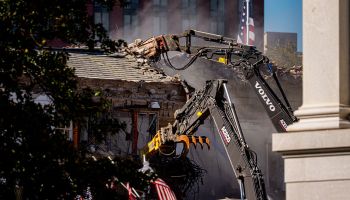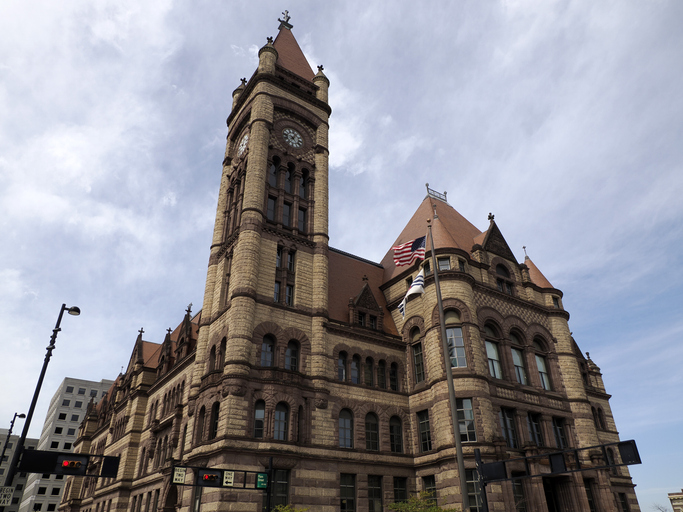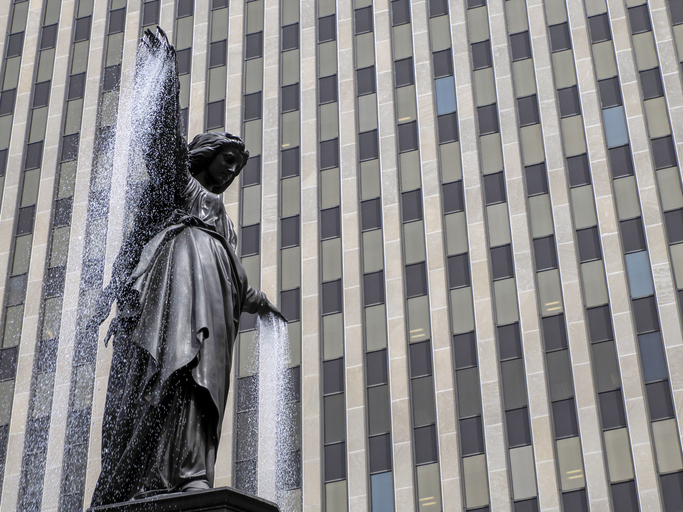The Atlanta Way Can’t Beat the Authoritarian Playbook

The public outrage on the Left over President Trump’s edicts cannot be overstated. This is especially true in cities and states boasting Black leadership. Alas, while mayors like Brandon Johnson in Chicago steadfastly confront the administration’s law enforcement takeovers and align themselves with everyday people, others like Muriel Bowser in Washington, D.C., equivocate, conceding that the president’s unconstitutional overreach is a welcome intrusion, without regard for the concrete harm marginalized people suffer during police occupations. Under the leadership of Mayor Andre Dickens, Atlanta—the so-called “Black Mecca”—occupies a peculiar space.
“The Atlanta Way” was popularized as a phrase in the 1950s to 1960s as a way for Atlanta to distinguish itself from other Southern cities through its approach to desegregation and civic unity. Ten months into 2025, Mayor Dickens and the Atlanta City Council continue to avoid decisive action on the sweeping right-wing agenda overtaking democracy. While the city has seemingly been spared from the most targeted attacks from the White House, few agree on the reason. Politicos and officials muse that this turn of fortune is perhaps because Dickens has been smart on policy. The more ominous truth is that Atlanta’s leadership has already waged war on the same progressive reforms that D.C. now exploitatively laments. By recklessly capitulating to conservative lawmakers in recent years on policies like wealth-based detention and homelessness, Atlanta’s Black leadership elevates their individual self-preservation over progress, leaving less policy work for federal officials to do.
In the shadows of government-sponsored public relations stunts, Georgia’s capital city maintains the highest racial wealth gap in the country and sends more people to Georgia prisons than any other. The Atlanta Police Department arrests more people for low-level offenses than over 85% of other police departments nationally, and nearly all those people are Black. Preoccupied with uninspiring performances of “Black excellence,” too many local officials have foolishly maligned one feature that cemented Atlanta’s legacy in modern civil rights: cross-class solidarity with grassroots movements.
The “Progressive” Authoritarian Playbook
According to leading scholars, the seven key elements of The Authoritarian Playbook are:
- Quashing Dissent
- Scapegoating Vulnerable Communities
- Spreading Disinformation
- Politicizing Independent Institutions
- Aggrandizing Executive Power
- Corrupting Elections
- Stoking Violence
Of course, this list typically refers to autocratic nation-state leaders who make history by committing egregious human rights abuses in contexts that render devastation unmistakable. On the local stage, many struggle to identify when leaders who profess humanitarian values run afoul of democracy’s mandates. When it comes to so-called progressives, anti-democratic political shifts are cloaked in pragmatism.
Quashing Dissent & Scapegoating Vulnerable Populations
According to many members of civil society, Mayor Dickens and his allies have run one of the most successful anti-democratic administrations in Atlanta’s recent history. By marking those who disagree with him or the police force as terrorists, radicals, and outsiders, the Dickens camp stamped preemptive targets on the backs on some of Atlanta’s most civically engaged constituents and organizations. They have done this without reverence for history, routinely finding themselves on the other side of organizations chiefly responsible for the rights Black elected officials now enjoy.
The world watched as the city aided the conservative attorney general in prosecuting over 60 people in a racketeering case for participating in protests opposing a police militarization facility now known as “Cop City.” Public records recently released pursuant to a lawsuit filed by an independent press organization, Atlanta Community Press Collective, highlight the strong allyship between Dickens, the Atlanta Police Foundation, and conservative actors. Through attacks on protected dissent, they lay bipartisan waste to individual lives and chill advocacy efforts of organizations performing essential functions for people in need of aid. With the racketeering count against Stop Cop City defendants now dismissed and up on appeal, Dickens has been eerily silent.
When Cornelius Taylor was crushed to death by a City of Atlanta Department of Public Works vehicle during the clearance of a homeless encampment as he lay asleep in his tent just before MLK weekend, the city rushed to say few things that mattered, ultimately releasing a medical examiner report that attempted to blame Mr. Taylor for his own death. But the Dickens administration didn’t stop there. The city’s law department sent an email to the nonprofit organization organizing around Taylor’s killing, warning them that their activities may not be compliant with tax laws. This transparently tacit threat was sent even as civil society scrambled to grapple with the implications of federal attacks on nonprofit funding. When confronted by the organization’s lawyers, the city pivoted and claimed to be interested in helping the group advance its strategy.
Dickens released a press statement after the 2024 ruling in Grant’s Pass v. Johnson, vowing to protect our unhoused neighbors. He boasts having built 10,000 new affordable housing units and claims to be committed to compassionate approaches to homelessness. Yet, as Atlanta prepares to host the World Cup in 2026, it is promoting the “Downtown Rising” plan, which, although framed as a housing-first humanitarian effort, explicitly relies on the clearance of encampments. This not only aligns with the SCOTUS ruling in Grants Pass, but also edicts in the July 24 Executive Order “Ending Crime and Disorder on America’s Streets,” which urges the criminalization of homelessness. Recently, organizers published a petition with over 1400 signatures, demanding that the city fulfill its promise to provide wraparound services and house the people who lived at the site of Mr. Taylor’s death.
Spreading Disinformation, Politicizing Independent Institutions, Aggrandizing Executive Power
On a periodic basis, emails from “Atlantans for Safety” are blasted to constituents on behalf of the Dickens Administration. The organization itself is a bit of a mystery. It’s run by a former Dickens staffer and initially disseminated mostly propaganda about Cop City and crime. Over time, it has become part of Dickens’ robust misinformation apparatus. From claims about the mayor nearly single-handedly achieving a decline in crime to fluff pieces about questionable homelessness initiatives, few bat an eye at the shameless leveraging of a non-governmental entity for official purposes.
City Council, which is the legislative branch intended to serve as a check and balance on executive power, has done little to challenge Dickens or his conservative allies at the Georgia State Capitol. This has not only been true in the context of the Cop City debate, but also in matters like the assault on the Office of the Inspector General, which became a target for Dickens and his allies on the City Council. Then Inspector General Shannon Manigault rang the alarm on obstruction from officials by speaking during public comment at a council meeting. The response from Councilmembers Marci Collier Overstreet, Andrea Boone, and Michael Julian Bond—all of whom represent majority Black parts of the city—was to introduce legislation to significantly curtail the office’s authority. Much of this fight ironically took place as President Trump fired federal inspectors general.
Not even nationally celebrated programs have been safe from politicized attacks. Atlanta’s Policing Alternatives and Diversion Initiative (PAD), which provides communities and police with the option of referring those in need of care rather than jail, became a target after taking stands contrary to Dickens. When the mayor erected an illegal procurement process to circumvent the award of a contract that PAD had already successfully won, his allies Overstreet, Bond, and Boone amplified talking points that vilified the program. PAD was ultimately victorious in maintaining its contract after public outcry, but it was not without significant exhaustion of community resources.
Stoking Violence and Corrupting Elections
The cultivation of violence among the general public often relies on a them vs. us framework. From the Jim Crow South to Nazi Germany, the slippery slope to dehumanization begins with the notion that only certain kinds of people are worth protecting. The Atlanta Way, which is the partnership of Atlanta’s Black political elite class with white-led commerce, has escalated the violence regularly enacted upon poor and working-class people through official policies.
Whether on the micro or macro scale, the othering leveraged to grant unchecked power to governmental actors is pervasive. In Atlanta, Mayor Dickens and his cronies decry outsiders unless, for example, those actors are legislators from rural Georgia who sponsor bills that rob his city of its authority to implement policies such as bail reform or CEOs of Fortune 500 companies promising further development. City Hall bemoans “radicals” unless such people are those who openly vilify immigrants and student protesters. They decry police violence unless it is in their own backyards at the hands of their own officers.
There is a better Atlanta Way
Recent legislative sessions in Georgia have been brutal on poor and working-class people. Dickens and his enablers have been all-consumed with Cop City–blocking a referendum on the matter that they couldn’t be bothered to even attempt to protect bail reform from Senate Bill 63, which weakened Atlanta’s 2019 reform and criminalized charitable bail funds. They were so fixated on the 2026 World Cup that they did not publicly lobby against anti-encampment bills. So preoccupied with currying favor with conservatives that he was seldom seen aligned with those they vow to protect. Now that FIFA has reversed course on the president’s power to move games from cities he deems “unsafe,” Atlanta officials remain undaunted, believing that their conservative values will carry the day.
Free and fair elections are the foundation of democracy. Yet, when asked by a news outlet whether he anticipates serious challengers in this year’s mayoral race, Dickens made a curiously intimidating comment, warning in a tone disturbingly similar to our current president, “Every punch I threw and every punch I took, everybody felt all,” he said. “I don’t know if anyone wants to be hit like that. This is a full-contact sport.” Mayor Andre Dickens may not be an authoritarian, but he routinely wields the tactics of the authoritarian playbook to the detriment of marginalized Atlantans.
Our social safety net is rotting rapidly before our eyes. As attacks on the funding and security of organizations accelerate due to federal policy, Mayor Dickens puts those very same public servants in the crosshairs when they dare to challenge him, seemingly unaware that he is also ensuring his own demise.
Tiffany Roberts is the Public Policy Director at the Southern Center for Human Rights, a nonprofit law firm working for equality, dignity, and justice for people impacted by the criminal legal system in the Deep South.
SEE ALSO:
The Coup Ain’t Coming. It’s Already Here
Donald Trump Wants Only White ‘Refugees’ In US
The Atlanta Way Can’t Beat the Authoritarian Playbook was originally published on newsone.com













